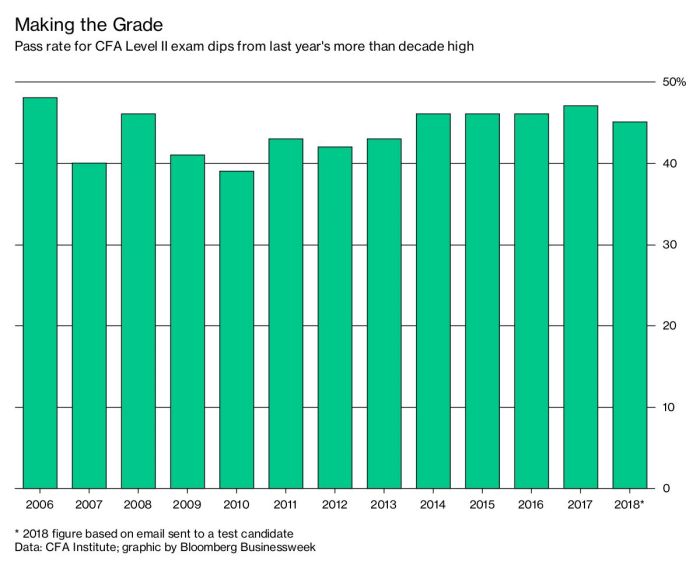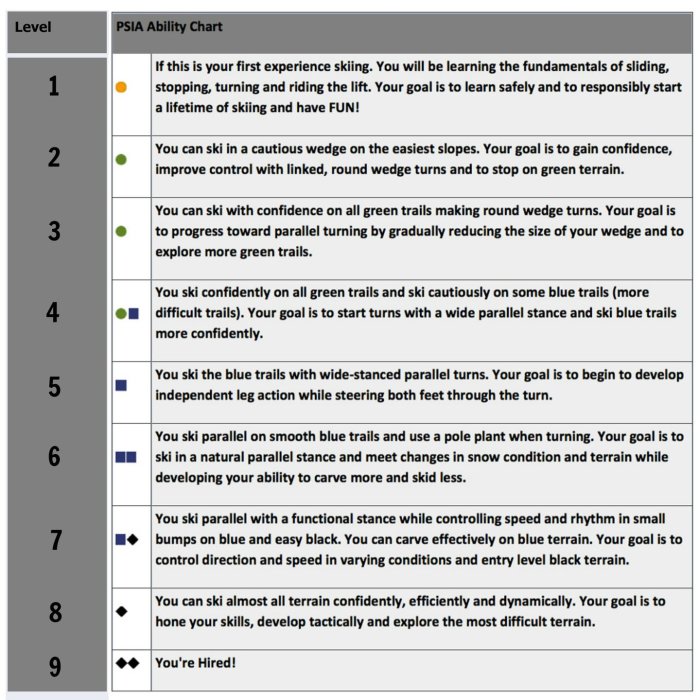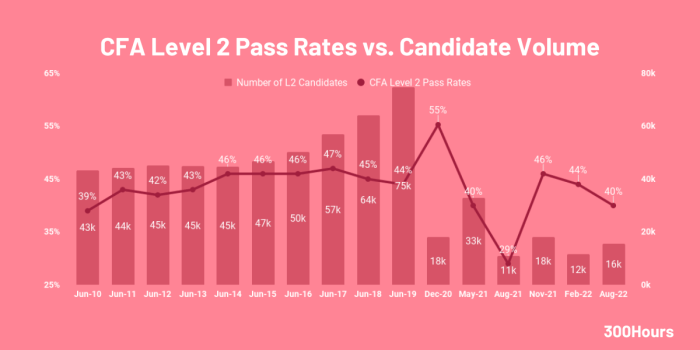The PSIA Level 2 pass rate stands as a beacon of excellence in the ski industry, setting the standard for aspiring instructors. This comprehensive guide delves into the intricacies of the exam, providing valuable insights and strategies to maximize your chances of success.
As you embark on this journey, you’ll discover the factors that influence the pass rate, including the significance of experience, training, and the mastery of key skills. We’ll also explore the role of examiner subjectivity and provide tips on how to navigate this aspect of the exam.
Overview of PSIA Level 2 Pass Rate
The Professional Ski Instructors of America (PSIA) Level 2 certification is a widely recognized credential in the ski industry, demonstrating an instructor’s ability to teach intermediate to advanced skiers effectively.
The overall pass rate for the PSIA Level 2 exam varies from year to year. In recent years, the pass rate has typically been around 70-80%. This indicates that the exam is challenging, but it is also achievable with proper preparation and training.
Factors Influencing Pass Rate
Several factors can influence the pass rate for the PSIA Level 2 exam, including:
- Level of experience and training of the candidates
- Difficulty of the exam in a particular year
- Availability of qualified examiners
Importance of Certification
Earning a PSIA Level 2 certification can benefit ski instructors in several ways, including:
- Increased job opportunities and earning potential
- Enhanced credibility and professional recognition
- Access to continuing education and professional development opportunities
Factors Influencing PSIA Level 2 Pass Rate

The PSIA Level 2 pass rate is influenced by several key factors, including the experience and training of the candidates, the skills and techniques assessed in the exam, and the subjectivity of the examiners.
Experience and Training
Candidates with more experience in skiing and teaching have a higher chance of passing the PSIA Level 2 exam. This is because they have a stronger foundation in the fundamental skills of skiing and a better understanding of how to teach these skills to others.
In addition to experience, candidates who have received formal training from a PSIA-certified instructor are also more likely to pass the exam. This is because they have been taught the correct techniques and have had the opportunity to practice them under the guidance of an experienced instructor.
Skills and Techniques
The PSIA Level 2 exam assesses a wide range of skills and techniques, including:
- Basic skiing skills, such as edging, turning, and stopping
- Advanced skiing skills, such as carving, skiing in powder, and skiing on steeps
- Teaching skills, such as communication, demonstration, and feedback
Candidates who are proficient in all of these areas are more likely to pass the exam.
Examiner Subjectivity
The PSIA Level 2 exam is graded by a panel of examiners. These examiners are all experienced skiers and teachers, but they may have different opinions about what constitutes a passing performance.
This subjectivity can lead to some variation in the pass rate from year to year. However, the PSIA has taken steps to minimize the impact of examiner subjectivity by developing a detailed scoring rubric that all examiners must use.
Preparation Strategies for PSIA Level 2 Exam

To excel in the PSIA Level 2 exam, meticulous preparation is paramount. Candidates should engage in a structured training regimen that combines on-snow practice and theoretical knowledge acquisition.
Recommended Training and Practice Methods
- Enlist a Qualified Instructor:Seek guidance from an experienced PSIA-certified instructor who can provide personalized feedback and technical expertise.
- Regular On-Snow Training:Dedicate ample time to skiing, focusing on developing strong fundamental skills and refining technique.
- Mock Exams:Simulate the exam environment by taking mock tests under the supervision of a qualified instructor or mentor.
- Video Analysis:Record your skiing and review it critically to identify areas for improvement.
- Physical Conditioning:Maintain a high level of fitness to endure the physical demands of the exam.
Improving Skiing Technique and Knowledge of Ski Theory
Enhancing skiing technique involves practicing fundamental movements such as edging, carving, and gliding efficiently. Simultaneously, candidates should expand their theoretical knowledge of ski equipment, biomechanics, and snow science.
Improving your psia level 2 pass rate can be a daunting task. But it doesn’t have to be. One essential skill for data analysis is knowing how to sum in Excel. Check out this guide: How To Sum In Excel . Mastering this skill can significantly boost your efficiency in handling data, making it easier to analyze trends and make informed decisions.
By incorporating this technique into your workflow, you’ll be well on your way to passing the psia level 2 exam.
Insights from Successful Candidates
- Structured Training Plan:Successful candidates typically adhere to a well-defined training schedule that balances on-snow practice with theoretical study.
- Technical Proficiency:They demonstrate exceptional skiing technique, executing maneuvers with precision and fluidity.
- Communication Skills:They possess strong communication skills, enabling them to effectively convey instructions and feedback to students.
- Passion for Skiing:A genuine passion for skiing drives successful candidates to continually improve and share their knowledge.
Strategies for Improving PSIA Level 2 Pass Rate

Enhancing the PSIA Level 2 pass rate requires a strategic approach that addresses the specific demands of the exam. This involves designing a training program that targets the required skills, creating a comprehensive study plan, and engaging in guided practice sessions with qualified coaches.
Design a Training Program
The training program should focus on developing the specific technical and tactical skills required for the exam, including:
- Precision skiing and edging control
- Dynamic movement patterns
- Effective use of body position and balance
- Tactical decision-making in various snow conditions
Create a Study Plan
A well-structured study plan ensures comprehensive coverage of the technical and theoretical aspects of skiing. It should include:
- Review of fundamental skiing concepts
- Study of PSIA teaching methodology and principles
- Analysis of exam requirements and expectations
Organize Practice Sessions
Regular practice sessions with qualified coaches provide invaluable feedback and guidance. These sessions allow candidates to:
- Refine their technique and address areas for improvement
- Develop confidence and consistency in their skiing
- Gain insights into exam expectations and strategies
Case Studies and Examples

Examining case studies of successful PSIA Level 2 exam takers offers valuable insights into effective preparation strategies and key skills.
These case studies highlight the commonalities among successful candidates, such as consistent training, utilization of diverse learning resources, and a strong understanding of the exam format and content.
Preparation Strategies
- Dedicated Training Schedule:Successful candidates allocate ample time for consistent practice and training, ensuring they are well-prepared for the exam.
- Diverse Learning Resources:Utilizing a range of resources, including textbooks, online courses, and coaching sessions, helps candidates gain a comprehensive understanding of the exam material.
- Exam Format and Content Understanding:Familiarizing themselves with the exam format and content allows candidates to allocate their time effectively during the exam.
Key Skills
- Technical Proficiency:A strong foundation in skiing techniques and principles is crucial for success on the exam.
- Teaching Ability:Candidates must demonstrate their ability to effectively teach skiing skills to students of varying levels.
- Communication and Interpersonal Skills:Clear and effective communication, along with strong interpersonal skills, are essential for success in the ski industry.
Best Practices
- Mock Exams:Taking practice exams under timed conditions helps candidates familiarize themselves with the exam environment and identify areas for improvement.
- Video Analysis:Recording and analyzing their skiing techniques allows candidates to identify areas for refinement.
- Peer Feedback:Seeking feedback from fellow candidates or instructors provides valuable insights and helps candidates improve their teaching skills.
Industry Trends and Future Outlook: Psia Level 2 Pass Rate
The ski industry is constantly evolving, with new trends and technologies emerging that impact the way people learn and practice skiing. These trends are likely to have a significant impact on the PSIA Level 2 pass rate in the coming years.
Technological Advancements, Psia level 2 pass rate
Technological advancements are playing an increasingly important role in ski training and exam preparation. For example, virtual reality (VR) and augmented reality (AR) are being used to create immersive and interactive learning experiences. These technologies can help students visualize complex concepts and practice skills in a safe and controlled environment.
Online learning platforms are also becoming more popular, providing students with the flexibility to learn at their own pace and on their own schedule. These platforms often offer interactive simulations and quizzes that can help students prepare for the PSIA Level 2 exam.
Changing Demographics
The demographics of the ski industry are also changing, with more and more people from diverse backgrounds participating in the sport. This is leading to a greater demand for ski instructors who are able to teach a wider range of students.
The PSIA Level 2 certification is designed to prepare ski instructors to teach students of all ages and abilities. As the demographics of the ski industry continue to change, the PSIA Level 2 pass rate is likely to increase as more instructors seek to obtain this certification.
Future of the PSIA Level 2 Certification
The PSIA Level 2 certification is a valuable credential for ski instructors. It demonstrates that instructors have the knowledge and skills to teach skiing safely and effectively.
As the ski industry continues to evolve, the PSIA Level 2 certification is likely to remain a relevant and important credential for ski instructors. The certification is likely to continue to be updated to reflect the latest trends and technologies in ski instruction.
Expert Answers
What is the overall pass rate for the PSIA Level 2 exam?
The overall pass rate for the PSIA Level 2 exam varies year to year, but typically hovers around 70%.
What are the key skills and techniques assessed in the exam?
The exam assesses a wide range of skills, including skiing technique, teaching methodology, and knowledge of ski theory.
How can I improve my chances of passing the exam?
To improve your chances of passing the exam, focus on developing your skiing technique, studying ski theory, and practicing teaching skills.